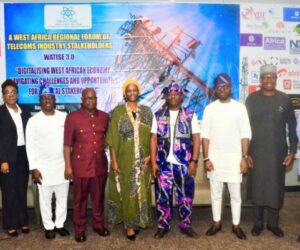2
Policymakers, business leaders, farmers, and development partners, and others, from across Africa converged in Abuja for the Sahel Food Systems Changemakers Conference 2025, hosted by Sahel Consulting Agriculture & Nutrition Ltd.
The event was organized in partnership with the Mastercard Foundation, Heifer International, and GIZ with the theme “Designing for Legacy: Building Resilient and Impact-Driven Food Systems”. The conference called on changemakers to rethink how agricultural systems are designed and sustained, urging a shift from short-term projects to long-term, people-centred transformation.
The Minister of Budget and Economic Planning, Senator Abubakar Bagudu, stated that food systems transformation is not just an agricultural issue, but an economic and developmental imperative.“It is worth stating that building resilient and impact-driven food systems should be hardwired to any economic plan because not only is it a demonstration of the fact that food systems are driven by modernisation and innovation and creativity, and the fact that in moving from primitiveness to modern food systems.”
The Minister of Agriculture and Food Security, Abubakar Kyari, who was represented by Director and Head of the Ministry’s Nutrition and Food Safety Department, Nuhu Kilishi, emphasised the importance of developing the value chain, minimising post-harvest losses, and ensuring the inclusion of women, youth, and marginalised farmers in the growth process.
In his opening address, Mezuo Nwuneli, Co-founder of Sahel Consulting, underscored the urgency of preparing Africa’s food systems for the continent’s rapid population growth. “Over 500 million people will be added to Africa’s population over the next 10 years, and these individuals need to be fed,” he said.
“We’re either going to do it with homegrown food or with imports. We need to boost yields, improve efficiencies, and enable farmers to grow more. Most importantly, we need homegrown solutions, not copy-and-paste models from elsewhere,” he said. Nwuneli’s remarks set the tone for the day a call to action for African-led innovation that empowers local farmers and strengthens regional food value chains.
Temi Adegoroye, Managing Partner at Sahel Consulting, expanded on the conference theme, explaining that legacy and sustainability must be built into every stage of agricultural intervention.
“Designing for legacy means embedding sustainability right from the start,” she said. “It’s about building systems that begin with people and shifting from short-term fixes to long-term transformation. True impact isn’t about how much we spend, but about programmes that continue to create change long after funding has stopped.”
Temi emphasised the importance of aligning projects with long-term national priorities and investing in institutions that can sustain progress beyond donor cycles.
In his speech, the Honourable Minister of Budget and Economic Planning, Abubakar Atiku Bagudu, commended Sahel Consulting for creating a platform that connects policy, private sector innovation, and grassroots action.
Speaking on the theme, he said: “It is worth stating that building resilient and impact driven food systems should be hardwired into every economic plan, as it reflects the understanding that food systems thrive on modernisation, innovation, and creativity, marking the shift from traditional to modern approaches to food production and distribution.”
Ndidi Nwuneli, Co-founder of Sahel Consulting, spoke about leadership, influence, and the power of local action in achieving food and nutrition security.“Legacy is enduring impact. It is influence. It is what a leader leaves behind, and it applies to all of us,” she said. She urged participants to embrace local sourcing as a strategic choice that benefits both people and the planet.“When you source locally, you support our farmers, strengthen distributors across the value chain, and deliver better for your people. The shorter the value chain, the healthier the food.”
Ndidi’s reflections reminded attendees that the health of Africa’s food systems depends not just on innovation but on shared responsibility and inclusive growth.
One of the defining moments of the conference was the Action Roundtable segment, a series of breakout sessions designed to move beyond discussion and establish practical next steps.
Participants engaged in thematic roundtables exploring key priorities for Africa’s food systems. Discussions on governance and policy innovation stressed stronger collaboration for policy alignment and accountability, while climate-smart agriculture focused on scaling resilience-building technologies.
The youth and women inclusion session highlighted the need for inclusive financing and leadership opportunities, and financing and investment called for blended finance models and long-term strategies to sustain agricultural transformation. Each roundtable produced specific commitments and action points to guide future collaboration among partners and stakeholders, ensuring that the ideas shared translate into measurable impact.
The Sahel Food Systems Changemakers Conference 2025 reinforced Sahel Consulting’s mission to bridge vision with action, research with policy, and people with opportunity.
As conversations wrapped up, participants agreed on one unifying message: Africa’s food future must be homegrown, sustainable, and built to last.







